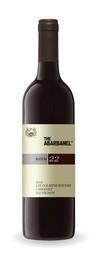Review of Abarbanel Batch 22, Cabernet Sauvignon 2013 and a revisit to Boulard Calvados XO.
By Joshua E. London and Lou Marmon
Washington Jewish Week March 4, 20015

One of our longtime favorite “Davids” in the kosher wine world is the Abarbanel Brand Wines, run by Howard Abarbanel. In its heyday, the Abarbanel Brand (established in 1992), led the pack with the most innovative and diverse portfolio of imported kosher wines.
Abarbanel Brand strove, as Howard once put it to one of us, “to create new and different kosher wines to broaden the types of wine available to the kosher consumer.” He has always insisted that “leadership” in kosher wine “is about the quality and caliber of the wines” rather than merely volume sales, and he built a reputation for wines that were “estate grown, hand-harvested and estate bottled” with “maximal kashrut and maximum quality.”
Part of his long-term mission has been to help foster a culture of general wine appreciation and healthy consumption in the American kosher consumer world. As he put it: “not every wine is meant to ‘blow you away,’ many wines are meant to enjoy with pizza or pasta on a Wednesday night or for an average Shabbat meal on a Friday or Saturday, not necessarily a special occasion.” To be sure, Abarbanel Brand had its share of “knock-out” wines too, but his vision was, and remains, well beyond that. “We are not producing wines just for the Robert Parkers of the world,” he explained [Parker being one of the world’s leading wine critics], but also “for average kosher Jews.” In this, thankfully, Abarbanel delivered the goods.
Abarbanel was the first to the US market with kosher Beaujolais and Chilean Malbec, for example, as well as the first to bring in kosher wines from Australia, South Africa, Portugal, Germany, the Alsatian Pinot Noir, and the list goes on and on. Not every of these “firsts” was a success (even now, there is reluctance in the marketplace when it comes to kosher German or Austrian wines), and some were probably a mistake (his line of Roberto Cohen sourced Burgundies shattered the previous price barrier and reached, lamentably, to the stars—likely an inevitable development, but ever since there has been a significant segment of kosher wines priced solely for the significantly well-healed). His successes attracted attention from the Goliaths in the market, and others have since taken up the banner of portfolio diversity.
Eventually Abarbanel closed the import and distribution part of his business, retiring from hustle and bustle to enjoy the fruits of his labor. Although he maintained the Abarbanel brand itself, it was being licensed and run by Admiral Imports of New Jersey from early 2010 until last year. Following the bankruptcy and collapse of Admiral, however, Abarbanel is back at the helm, and is busy rebuilding the brand, which is now imported and distributed by Faropian Spirits, Ltd.
Abarbanel Brand Wines currently features a limited portfolio of well-made, enjoyable, reasonably priced, single vineyard wines, such as his (mevushal) Abarbanel Batch 22, Cabernet Sauvignon 2013 ($14), sourced from Les Dolmens Rouges, a single vineyard near Ouveillan in the Aude River Valley in the South of France. This inviting, food friendly quaffer offers dark currant, red berry and cranberry flavors accented with some spice and tobacco. This offers terrific bang for your buck for those seeking an interesting yet unpretentious wine to jovially lubricate an everyday meal, or cater an event. There is also a similarly priced and similarly enjoyable (mevushal) single vineyard Unoaked Chardonnay.
Spirits-wise, we thought we’d stick with France and revisit a wonderful Calvados:
Boulard Calvados XO NV (40 percent abv; $90): Blended from 8- to 40-year-old Calvados, this is a full-bodied, rich, velvety smooth, elegant spirit with aromas and flavors of apples, sweet vanilla, cinnamon, toasted nuts, raisins, allspice, toffee, and tart citrus fruits, with a lovely toasty, oily and spicy apple cider finish. A bit more spirity than appley, but oh so absorbing. L’Chaim!
